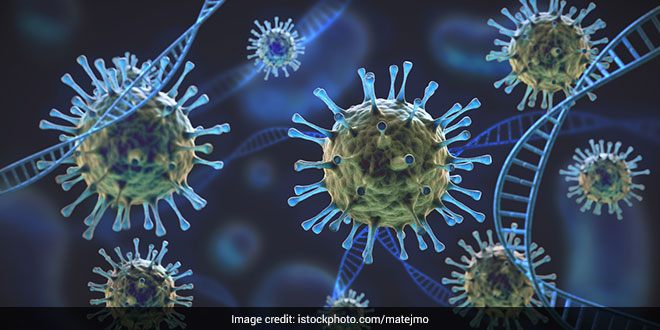Highlights
- Over the next decade, the severity of COVID-19 may decrease: Researcher
- The researcher cited ‘population’s immunity’ behind decrease in severity
- If variants overcome partial immunity, COVID-19 could turn for the worse
New Delhi: The novel coronavirus responsible for COVID-19 could cause no more than common cold-like coughs and sniffles within the next decade, according to a study. The research, published in the journal Viruses, makes this likely prediction based on mathematical models that incorporate lessons learned from the current pandemic on how our body’s immunity changes over time. “This shows a possible future that has not yet been fully addressed,” said Fred Adler, a professor of mathematics and biological sciences at the University of Utah in the US.
Also Read: COVID-19: Two Oxford/Astrazeneca Vaccine Doses 85-90 Per Cent Effective, Real-World Study Finds
Over the next decade, the severity of COVID-19 may decrease as populations collectively develop immunity, Fred Adler said.
The study suggests that changes in the disease could be driven by adaptations of our immune response rather than by changes in the virus itself. Although the SARS-CoV-2 virus is the best-known member of the family, other seasonal coronaviruses circulate in the human population, and they are less dangerous. The researchers noted that some evidence indicates that one of these cold-causing relatives might have once been severe, giving rise to the “Russian flu” pandemic in the late 19th century. The parallels led the scientists to wonder whether the severity of SARS-CoV-2 could similarly lessen over time. They built mathematical models incorporating evidence on the body’s immune response to SARS-CoV-2. Analysing several scenarios and their versions set up a situation where an increasing proportion of the population will become predisposed to mild disease over the long term.
Also Read: Expert Answers Questions On COVID-19 Vaccination And Treatment
In the beginning of the pandemic, no one had seen the virus before. Our immune system was not prepared, Fred Adler explained.
The models show that as more adults become partially immune, whether through prior infection or vaccination, severe infections all but disappear over the next decade, the researchers said. Eventually, the only people who will be exposed to the virus for the first time will be children who are naturally less prone to severe disease, they said.
Also Read: COVID Challenge Remains As Long As Infection Exists Even At Minor Scale: PM Modi
The novel approach here is to recognise the competition taking place between mild and severe COVID-19 infections and ask which type will get to persist in the long run, said Alexander Beams, study first author and graduate student at University of Utah.
“We have shown that mild infections will win, as long as they train our immune systems to fight against severe infections,” Alexander Beams said.
However, the researchers noted that the models do not account for every potential influence on disease trajectory. For instance, if new virus variants overcome partial immunity, COVID-19 could take a turn for the worse, they said. The team also noted that these predictions will hold up only if the key assumptions of the models hold up.
Our next step is comparing our model predictions with the most current disease data to assess which way the pandemic is going as it is happening, Fred Adler added.
Also Read: Third Wave Of COVID-19 Possible If Vaccination Not Ramped Up, COVID Norms Not Followed: Scientist
(This story has not been edited by NDTV staff and is published from a syndicated feed.)
NDTV – Dettol Banega Swasth India campaign is an extension of the five-year-old Banega Swachh India initiative helmed by Campaign Ambassador Amitabh Bachchan. It aims to spread awareness about critical health issues facing the country. In wake of the current COVID-19 pandemic, the need for WASH (Water, Sanitation and Hygiene) is reaffirmed as handwashing is one of the ways to prevent Coronavirus infection and other diseases. The campaign highlights the importance of nutrition and healthcare for women and children to prevent maternal and child mortality, fight malnutrition, stunting, wasting, anaemia and disease prevention through vaccines. Importance of programmes like Public Distribution System (PDS), Mid-day Meal Scheme, POSHAN Abhiyan and the role of Aganwadis and ASHA workers are also covered. Only a Swachh or clean India where toilets are used and open defecation free (ODF) status achieved as part of the Swachh Bharat Abhiyan launched by Prime Minister Narendra Modi in 2014, can eradicate diseases like diahorrea and become a Swasth or healthy India. The campaign will continue to cover issues like air pollution, waste management, plastic ban, manual scavenging and sanitation workers and menstrual hygiene.
[corona_data_new]















